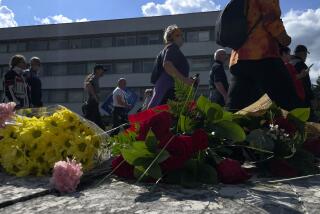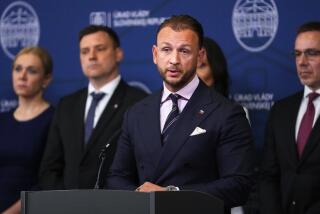Bosnian Serb Premier Ousted
- Share via
SARAJEVO, Bosnia-Herzegovina — In a stunning blow to the West’s efforts to isolate Radovan Karadzic, the Bosnian Serb strongman on Wednesday abruptly fired his prime minister, a moderate whom diplomats had been cultivating as an alternative leader.
“This is a coup against Dayton,” declared former Swedish Prime Minister Carl Bildt, the senior international official overseeing the peace agreement brokered last year in Dayton, Ohio.
By announcing his dismissal of Bosnian Serb Prime Minister Rajko Kasagic in a statement read on Bosnian Serb television and radio, Karadzic demonstrated his persistent grasp on power despite the peace pact’s requirement that he step down.
Karadzic, a war crimes suspect indicted on charges of genocide, moved against Kasagic just as the prime minister’s influence with the international community was growing. In marked contrast to Karadzic, who has sought to block many aspects of the peace plan, Kasagic was seen as a cooperative pragmatist by officials working to implement the Dayton accord.
Karadzic resists the peace agreement, and its vision of reuniting Bosnia-Herzegovina across ethnic lines, because it runs counter to his ideal of ethnic segregation, the very basis for the nationalist war he waged for 3 1/2 years.
In his broadcast statement, Karadzic said he was stripping Kasagic of his authority “to protect constitutional order . . . and prevent further deepening of the government crisis” and to further the “basic interests” of the Bosnian Serb people and their “country.”
Karadzic’s defiant display also puts renewed pressure on the 60,000-member NATO-led peacekeeping force to arrest the self-declared president of Republika Srpska.
The North Atlantic Treaty Organization, fearing for the safety of its forces, has steadfastly refused to seek out Karadzic or the Bosnian Serb army commander, Gen. Ratko Mladic, also a suspected war criminal, despite warnings from diplomats that their continued presence is jeopardizing the peace process and elections scheduled for September.
With NATO declining to act, U.S. and other Western leaders had instead sought to promote the more moderate Kasagic and a group of politicians based in the northern Bosnian Serb city of Banja Luka as a counterweight to Karadzic and his hard-line cohorts, who are based in Pale, a tiny ski village nine miles southeast of Sarajevo, the Bosnian capital.
Those efforts seem to have failed. “This shows how Karadzic can defy the Dayton settlement, thumb his nose at the international community and continue to call the shots,” a Western diplomat said.
Bildt and his mediators indicated that they still hope to marginalize Karadzic by ignoring Kasagic’s dismissal. At the same time, there are signs that Western leaders will again turn to Serbian President Slobodan Milosevic, the onetime mentor of the Bosnian Serbs, to press for Karadzic’s ouster.
NATO Secretary-General Javier Solana is scheduled to visit Banja Luka today and then continue to Belgrade, the capital of Serbia and Yugoslavia, for talks with Milosevic. NATO officials indicated that Solana will be exploring ways of neutralizing the political impact of Karadzic and Mladic that could fall short of arresting them.
“If they can’t be delivered into the hands of [the Hague] tribunal, they need at least to be removed from the political scene,” one official commented. “There’s a feeling Milosevic can do more to help, that he’s not using his full weight on this.”
By signing the Dayton accord, Milosevic committed himself to assisting in the removal of Karadzic and Mladic and their transfer to The Hague as accused war criminals.
*
The differences between Karadzic and Kasagic--and Karadzic’s ability to squash Kasagic’s efforts to cooperate with peacemakers--first became evident at a major donors’ conference in Brussels last month. Kasagic planned to attend the session, at which international bankers and investors eventually pledged $1.2 billion in reconstruction aid for Bosnia.
But Karadzic prohibited his prime minister from attending after he learned that the Serbs would be part of a single Bosnian delegation that included the Muslim-led Bosnian government.
Kasagic continued to position himself at odds with Karadzic. Last week in Banja Luka, he reportedly held secret meetings with anti-Karadzic members of the Bosnian Serb parliament in an effort to strengthen the moderate faction.
Also last week, Kasagic received high-profile visits in Banja Luka from Bildt and other international delegations. Over the past few months, ambassadors from the U.S., Britain, France and other countries have traveled to Banja Luka to court Kasagic and other Bosnian Serb politicians seen as moderates.
Kasagic had announced plans to shake up the Bosnian Serb government, saying he would replace a number of Cabinet ministers and other officials who were dragging their heels on the peace accord. That may have been the last straw for Karadzic.
Asked late last week about his relationship with the rest of his government, Kasagic told reporters: “Sometimes I make statements that someone may not like, but I want to create a society where people can freely attack me if they think I am doing something wrong.”
Times staff writer Tyler Marshall in Brussels contributed to this report.
More to Read
Sign up for Essential California
The most important California stories and recommendations in your inbox every morning.
You may occasionally receive promotional content from the Los Angeles Times.














